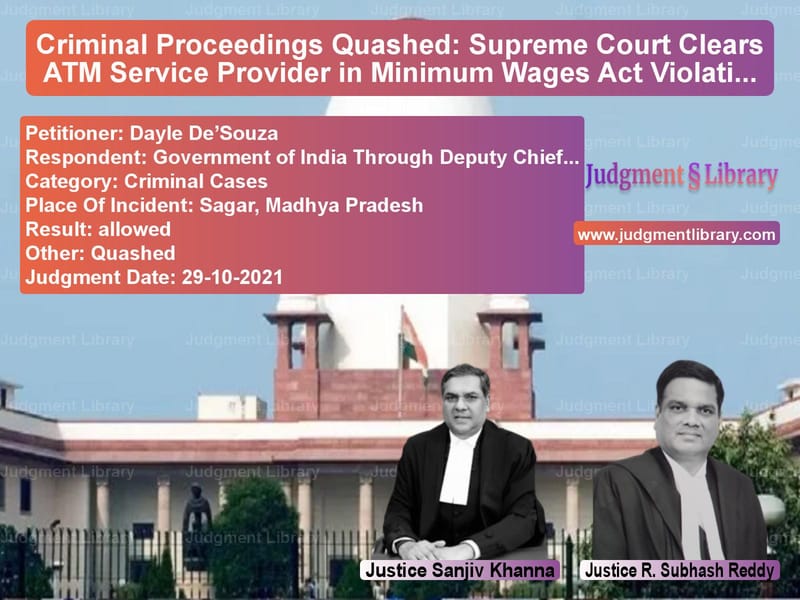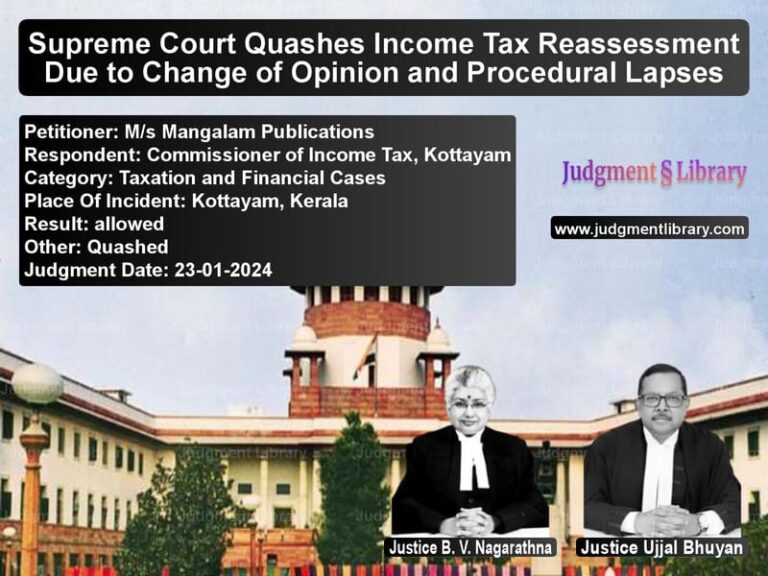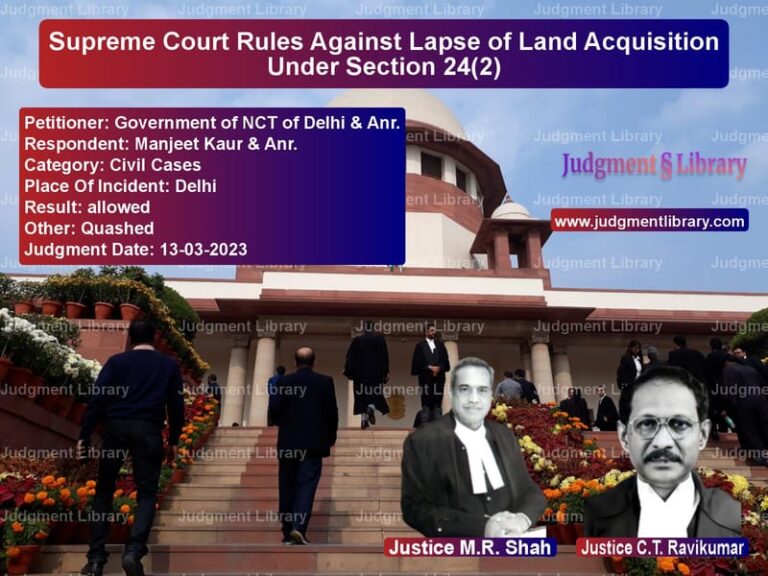Criminal Proceedings Quashed: Supreme Court Clears ATM Service Provider in Minimum Wages Act Violation
The Supreme Court of India, in the case of Dayle De’Souza vs. Government of India Through Deputy Chief Labour Commissioner, delivered a crucial judgment clarifying the scope of vicarious liability under the Minimum Wages Act, 1948. The Court ruled that a company director cannot be prosecuted unless the company itself is made an accused. This decision sets an important precedent in cases involving allegations of labor law violations against corporate executives.
Background of the Case
The case arose from an inspection conducted on February 19, 2014, at a State Bank of India ATM located at Komal Chand Petrol Pump, Civil Lines, Sagar, Madhya Pradesh. The Labour Enforcement Officer (Central) found alleged violations of the Minimum Wages Act, 1948, and the Minimum Wages (Central) Rules, 1950, including:
- Failure to maintain a fine register and other prescribed records.
- Absence of notices displaying minimum wages and other legal requirements.
- Failure to keep an attendance register at the worksite.
A notice was issued to Dayle De’Souza, a director of Writer Safeguard Pvt. Ltd., and Vinod Singh, the Madhya Pradesh head of the company. The company was responsible for servicing and replenishing ATMs under an agreement with NCR Corporation, which had a separate contract with SBI for ATM management.
Legal Proceedings
Complaint and Cognizance
On August 14, 2014, a criminal complaint was filed before the Chief Judicial Magistrate, Sagar, under Section 22A of the Minimum Wages Act. The Judicial Magistrate took cognizance and issued a bailable warrant against both individuals.
Challenge Before the High Court
Dayle De’Souza moved the Madhya Pradesh High Court under Section 482 of the Code of Criminal Procedure, seeking to quash the complaint. The High Court dismissed his petition on January 20, 2020, ruling that the complaint disclosed a prima facie offense.
Appeal to the Supreme Court
Aggrieved by the High Court’s decision, Dayle De’Souza appealed to the Supreme Court, arguing that:
- He was not responsible for day-to-day operations at the ATM.
- The company itself was not made an accused, making prosecution against its director untenable.
- The provisions of the Minimum Wages Act did not apply to the specific work his company was performing.
Key Legal Issues
The Supreme Court examined two main questions:
- Can a director be prosecuted without the company being made an accused?
- Did the complaint sufficiently establish liability under the Minimum Wages Act?
Supreme Court’s Analysis
On Vicarious Liability
The Court emphasized that under Section 22C of the Minimum Wages Act, both the company and individuals in charge of its operations can be prosecuted. However, the prosecution must first establish that the company itself committed an offense before holding its officers liable. The Court stated:
Read also: https://judgmentlibrary.com/supreme-court-modifies-conviction-in-robbery-and-dacoity-case/
“A person cannot be prosecuted and punished merely because of their status as a director unless the offense was committed with their consent, connivance, or due to their neglect.”
It further held that the onus is on the prosecution to prove such involvement.
On the Requirement to Make the Company an Accused
The Supreme Court relied on its earlier rulings in Aneeta Hada vs. Godfather Travels and Tours Pvt. Ltd., which held that:
“For maintaining prosecution under provisions imposing vicarious liability, the company must be arraigned as an accused.”
Since Writer Safeguard Pvt. Ltd. was not made an accused, the prosecution against its director was legally unsustainable.
On the Merits of the Complaint
The Court found that the complaint did not specify how De’Souza was involved in the alleged violations. The company had responded to the Labor Enforcement Officer’s notice, clarifying that it did not operate the ATM. The complaint failed to explain why this response was inadequate.
Final Judgment
The Supreme Court quashed the criminal proceedings against Dayle De’Souza and co-accused Vinod Singh. The Court emphasized:
“Initiating prosecution has serious consequences, and authorities must exercise discretion judicially.”
It reiterated that criminal proceedings should not be initiated mechanically and must be backed by specific allegations proving culpability.
Legal Precedents Affirmed
The ruling reaffirms key principles established in:
- Aneeta Hada vs. Godfather Travels and Tours Pvt. Ltd. – A company must be made an accused for its directors to be prosecuted.
- Municipal Corporation of Delhi vs. Ram Kishan Rohtagi – Directors cannot be prosecuted merely based on their position.
- Hindustan Unilever Ltd. vs. State of Madhya Pradesh – Prosecution must establish direct involvement of an officer in the alleged offense.
Conclusion
This judgment has far-reaching implications for corporate prosecutions in India. It establishes that:
- Authorities cannot prosecute directors without first prosecuting the company.
- Criminal liability requires specific allegations against individuals, not just their designation.
- Courts must scrutinize complaints to prevent abuse of process.
The ruling provides relief to corporate executives facing frivolous complaints and reinforces the principle that legal action must be grounded in substantive evidence.
Petitioner Name: Dayle De’Souza.Respondent Name: Government of India Through Deputy Chief Labour Commissioner.Judgment By: Justice Sanjiv Khanna, Justice R. Subhash Reddy.Place Of Incident: Sagar, Madhya Pradesh.Judgment Date: 29-10-2021.
Don’t miss out on the full details! Download the complete judgment in PDF format below and gain valuable insights instantly!
Download Judgment: dayle-de’souza-vs-government-of-india-supreme-court-of-india-judgment-dated-29-10-2021.pdf
Directly Download Judgment: Directly download this Judgment
See all petitions in Legal Malpractice
See all petitions in Contempt Of Court cases
See all petitions in Judgment by Sanjiv Khanna
See all petitions in Judgment by R. Subhash Reddy
See all petitions in allowed
See all petitions in Quashed
See all petitions in supreme court of India judgments October 2021
See all petitions in 2021 judgments
See all posts in Criminal Cases Category
See all allowed petitions in Criminal Cases Category
See all Dismissed petitions in Criminal Cases Category
See all partially allowed petitions in Criminal Cases Category







